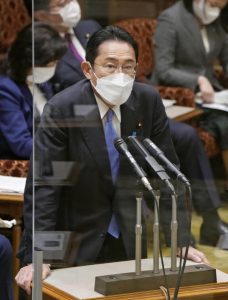Prime Minister Kishida rejects nuclear-sharing option, denounces Putin’s order to put Russian nuclear forces on high alert after invasion of Ukraine
Mar. 1, 2022
by Masaharu Nakagawa and Koji Higuchi, Staff Writers
On February 28, at a budget committee meeting in Japan’s House of Councilors (upper house of the Diet), Prime Minister Fumio Kishida (representing Hiroshima Prefecture’s District No. 1) commented on a "nuclear-sharing" option, designed to host U.S. nuclear weapons in Japan under the joint control of both countries. “From Japan’s perspective of upholding the three non-nuclear principles, the policy is unacceptable,” he said. Mr. Kishida also denounced Russian President Vladimir Putin for putting Russia’s nuclear forces on alert, following Mr. Putin’s comment suggesting that the country could potentially use its nuclear weapons arsenal.
Debate over the nuclear-sharing concept was initially sparked by former Japanese Prime Minister Shinzo Abe (representing Yamaguchi Prefecture’s District No. 4), who went on a February 27 television program and expressed his idea that Japan should deliberate on the idea given Russia’s invasion of Ukraine.
In response to questions in the Diet and elsewhere to this point in time, Mr. Kishida has advocated his objective of achieving a world without nuclear weapons, arguing that the three non-nuclear principles — which involve the non-possession, non-production, and non-introduction of nuclear weapons in Japan’s territorial area — amount to a national policy of the A-bombed nation. He also touched on Mr. Abe’s reference to what is assumed to be the development of a framework involving the sharing of U.S. nuclear deterrence for the purpose of self-defense, stressing that such a policy was unacceptable. He clarified that stance in his response to a question posed by Maiko Tajima, an upper house member from the Constitutional Democratic Party of Japan.
In his role as leader of a nuclear superpower, Mr. Putin made threatening remarks when declaring that, “Russia is among the most powerful nuclear states in the world,” following which he put his nuclear forces on high alert. When Masahisa Sato, director of the Foreign Affairs Division of the Liberal Democratic Party (LDP), asked the prime minister about his response to Mr. Putin’s actions, Mr. Kishida said, “Referring to nuclear weapons is dangerous behavior that will only make the situation more fragile.” He added, “As the only nation to have suffered an atomic bombing during wartime, Japan has the responsibility to forcefully point out such problems.”
In a national referendum, Belarus, a nation neighboring Ukraine with close ties to Russia, rejected a provision in its current constitution stipulating that the nation must maintain neutrality without possessing nuclear weapons. In a press conference held on February 28, Japan’s Chief Cabinet Secretary Hirokazu Matsuno explained that, “Belarus has now made it possible for the country to deploy nuclear weapons. That could lead to further instability. Japan is monitoring the situation with great care.”
(Originally published on March 1, 2022)
On February 28, at a budget committee meeting in Japan’s House of Councilors (upper house of the Diet), Prime Minister Fumio Kishida (representing Hiroshima Prefecture’s District No. 1) commented on a "nuclear-sharing" option, designed to host U.S. nuclear weapons in Japan under the joint control of both countries. “From Japan’s perspective of upholding the three non-nuclear principles, the policy is unacceptable,” he said. Mr. Kishida also denounced Russian President Vladimir Putin for putting Russia’s nuclear forces on alert, following Mr. Putin’s comment suggesting that the country could potentially use its nuclear weapons arsenal.
Debate over the nuclear-sharing concept was initially sparked by former Japanese Prime Minister Shinzo Abe (representing Yamaguchi Prefecture’s District No. 4), who went on a February 27 television program and expressed his idea that Japan should deliberate on the idea given Russia’s invasion of Ukraine.
In response to questions in the Diet and elsewhere to this point in time, Mr. Kishida has advocated his objective of achieving a world without nuclear weapons, arguing that the three non-nuclear principles — which involve the non-possession, non-production, and non-introduction of nuclear weapons in Japan’s territorial area — amount to a national policy of the A-bombed nation. He also touched on Mr. Abe’s reference to what is assumed to be the development of a framework involving the sharing of U.S. nuclear deterrence for the purpose of self-defense, stressing that such a policy was unacceptable. He clarified that stance in his response to a question posed by Maiko Tajima, an upper house member from the Constitutional Democratic Party of Japan.
In his role as leader of a nuclear superpower, Mr. Putin made threatening remarks when declaring that, “Russia is among the most powerful nuclear states in the world,” following which he put his nuclear forces on high alert. When Masahisa Sato, director of the Foreign Affairs Division of the Liberal Democratic Party (LDP), asked the prime minister about his response to Mr. Putin’s actions, Mr. Kishida said, “Referring to nuclear weapons is dangerous behavior that will only make the situation more fragile.” He added, “As the only nation to have suffered an atomic bombing during wartime, Japan has the responsibility to forcefully point out such problems.”
In a national referendum, Belarus, a nation neighboring Ukraine with close ties to Russia, rejected a provision in its current constitution stipulating that the nation must maintain neutrality without possessing nuclear weapons. In a press conference held on February 28, Japan’s Chief Cabinet Secretary Hirokazu Matsuno explained that, “Belarus has now made it possible for the country to deploy nuclear weapons. That could lead to further instability. Japan is monitoring the situation with great care.”
(Originally published on March 1, 2022)








